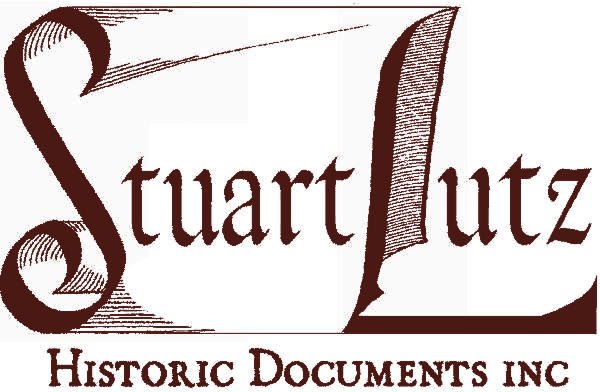| |
 JOHN HANCOCK JOHN HANCOCK |
|
|
|
|
| |
Price: $9,500.00 |
Stock# 6081 |
| |
A YOUTHFUL JOHN HANCOCK SIGNS A BOOK FROM HIS LIBRARY
JOHN HANCOCK (1736-1793). Hancock was President of the Second Continental Congress during the American Revolution. He signed the Declaration of Independence, and his is the most recognizable and iconic signature on that document.
SB. 240pg. 1757. No place. A book signed “John Hancock 1757” atop the title page. The book is The Adventures of David Simple. Volume The Last published in London in 1753. The book, the third in the series, was written by Sarah Fielding, an English novelist best remembered for The Governess, or The Little Female Academy; she was also the sister of the prominent author Henry Fielding. Based on the date, Hancock was 20 or 21 when he signed this volume. It has the original calf with gilt borders on the front and back covers; the rear cover has more wear than the front. The spine is relatively tight and the number “3” is marked in gilt. The inside pages are generally clean. There is also contemporary writing on the inside front cover; it appears as if someone practiced his or her alphabet there. Books from Hancock’s library are scarce; only a handful have appeared at auction in the last two decades. |
6081

|
|
| |
| |
 JEDIDIAH HUNTINGTON JEDIDIAH HUNTINGTON |
|
|
|
|
| |
Price: $350.00 |
Stock# 6045 |
| |
EARLY AMERICAN CONNECTICUT DOCUMENT SENDING TAX COLLECTOR TO PRISON FOR NOT PAYING TAXES: “COLLECTOR OF THE STATE TAXES FOR SAID TOWN…HAS NEGLECTED TO MAKE PAYMENT OF THE THREE PENNY TAX”
JEDIDIAH HUNTINGTON (1743-1818). Huntington was an American general during the Revolution before serving as Treasurer for the State of Connecticut and a customs house collector for Rhode Island and Connecticut from 1789 until his death.
DS. 2 pg. 7” x 12”. February 16, 1789. Connecticut. A partly-printed document signed “Jed Huntington Treasurer” and directed “To the Sheriff of Litchfield”. This official state document, partially handwritten and partially printed, asserts that “Mr. Elijah Woodward who was Constable of the town of Watertown in the County of Litchfield and Collector of the State Taxes for said Town…has neglected to make payment of the Three penny Tax…amounting to the Sum of Two hundred twenty two pounds fourteen shilling & six pence”. As a result, that amount, plus a one shilling and six pence penalty, will be taken from Woodward’s possessions or he must be imprisoned within the next sixty days. On the back of the document, in the hand of the Sheriff referenced above, is his response: “Then by virtue of the Execution and for want of Estate I Levied the same on the Body of the within named Elijah Woodward – and said the same in his hearing; and before I had opportunity to convey hm to Goal; I recd a Discharge from under the hands of the Selectmen of the Town of Watertown”. This response confirms that Woodward was not imprisoned or fined, at least initially. Little record remains of Woodward; in his obituary from 1840, it only notes that his age, 92, fit within a pattern of longevity for his immediate family. Regardless, debtors’ prison was a common way to deal with debt and financial mismanagement, deliberately or otherwise, in the early United States and Western Europe. The United States ostensibly eliminated the imprisonment of debtors under federal law in 1833, but individual states maintained the practice for decades longer. Therefore, this document is a fascinating reminder of a common early American legal practice. It is in fine condition, though the paper is thin. |
6045
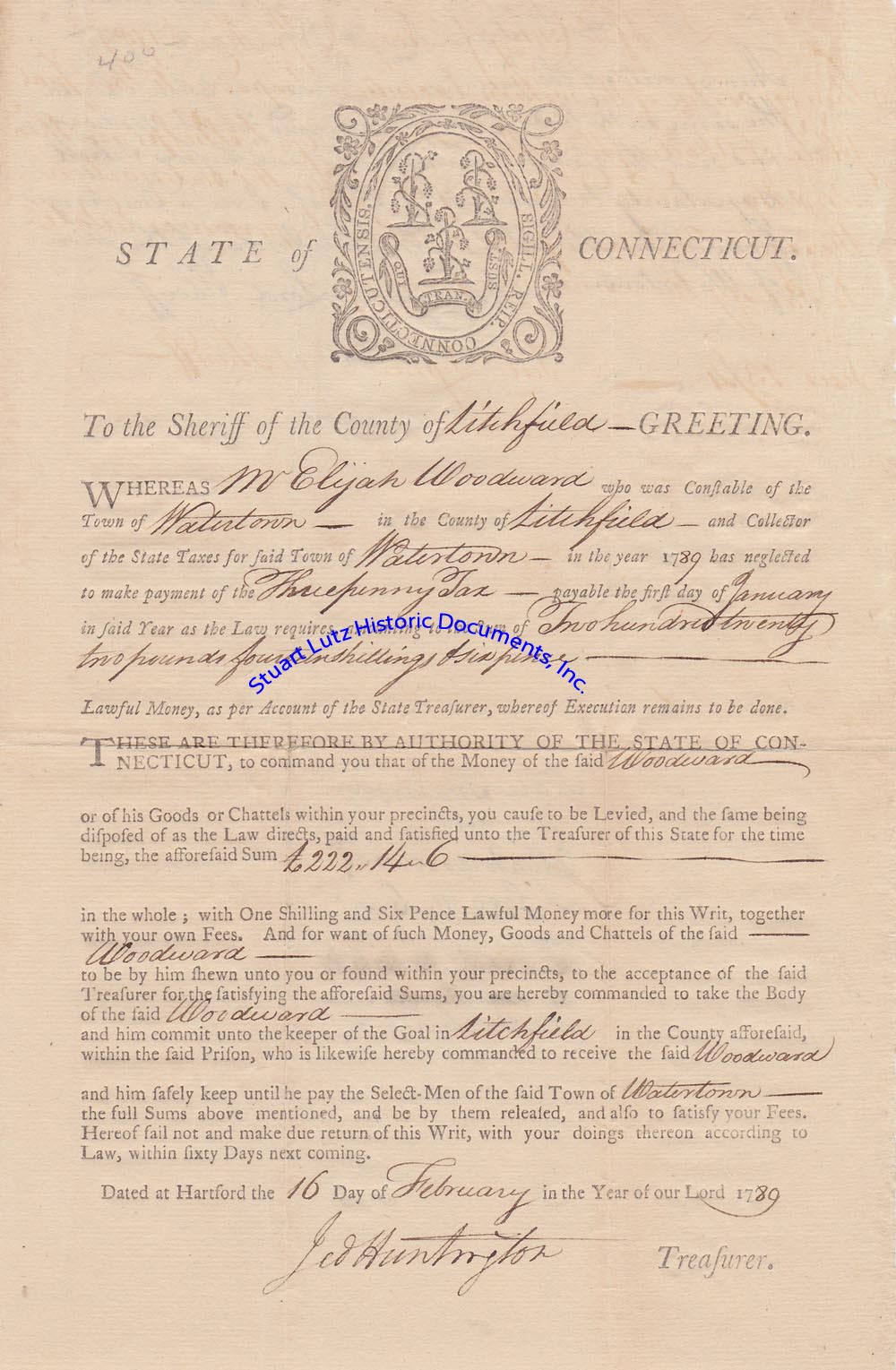
|
|
| |
| |
 SAMUEL HUNTINGTON SAMUEL HUNTINGTON |
|
|
|
|
| |
Price: $1,000.00 |
Stock# 4544 |
| |
A REVOLUTIONARY WAR-DATED CONNECTICUT DEBENTURE DOCUMENT SIGNED BY SEVERAL IMPORTANT CONNECTICUT POLITICIANS – DECLARATION OF INDEPENDENCE SIGNER SAMUEL HUNTINGTON, DAVENPORT, DYER, GRISWOLD, AND PITKIN
SAMUEL HUNTINGTON (1731-1796). Huntington was a Declaration of Independence Signer from Connecticut, and he also signed the Articles of Confederation. He also served as Governor of Connecticut.
ABRAHAM DAVENPORT (1715-1789). Davenport was a Revolution-era Connecticut politician and militia colonel.
ELIPHALET DYER (1721-1807). Dyer was a Connecticut lawyer and a delegate to the Continental Congress.
MATTHEW GRISWOLD (1714-1799). Griswold was a Revolution-era Connecticut politician and the Governor of Connecticut in the 1780s.
WILLIAM PITKIN (1694-1769). Pitkin was a Colonial Governor of Connecticut Colony.
DS. 1pg. February 3, 1779. Connecticut. A handwritten document signed by several important Revolution-era Connecticut politicians, “Matthw Griswold”, “Elipht Dyer”, “Wm Pitkin”, “Sam Huntington”, and “Abrm Davenport”. It was also signed “Wm Pitkin for M Sheldon” on behalf of an Elisha Sheldon, who may have been a Colonel in the Continental Army, and “Geo. Pitkin, Clerk”, likely by William Pitkin’s son. Written in the midst of the Revolutionary War, the document records payments on a debenture: “Superior Court Debenture on the Council in August, September & Oct’r 1778, viz. The Hon’ble Matthew Griswold Esq. 60 days £324:0:0 Matthw Griswold Eliphalet Dyer Esq. 30 days £162:0.0. re’d £25:10.0 recd the Balance April 15 1779 Elipht Dyer Wm Pitkin Esq. 60 days £306:0:0 Wm Pitkin Sam’l Huntington Esq. 53 days £270 6:0 Sam Huntington Elisha Sheldon Esq. Assistant 4 days £20:8:0 Wm Pitkin for M Sheldon Abraham Davenport Esq. Assis’t: 3 days £15:6:0 Abrm Davenport £1098:8:0 Cr as paid pr order 181:10:0 £916:10:0 To John Lawrence Esq Treasurer of the State of Connecticutt [sic] Sir please to pay to The Judges of the Sup’r Court and Assistants the Balance due on the foregoing Debenture being the sum of Nine Hundred & Sixteen Pounds Ten Shillings & Charge the State in Account therefor. February 3rd, 1779. Per the order of Court Geo. Pitkin, Clerk”. Docket: “Sup’r Court Debenture. Fall Circuit 1778. £916:10:0. Charged 4 Feb’ry 1779. No. 2 No. 241”. The document is in good condition with some light foxing and small tears in the deep folds. |
4544
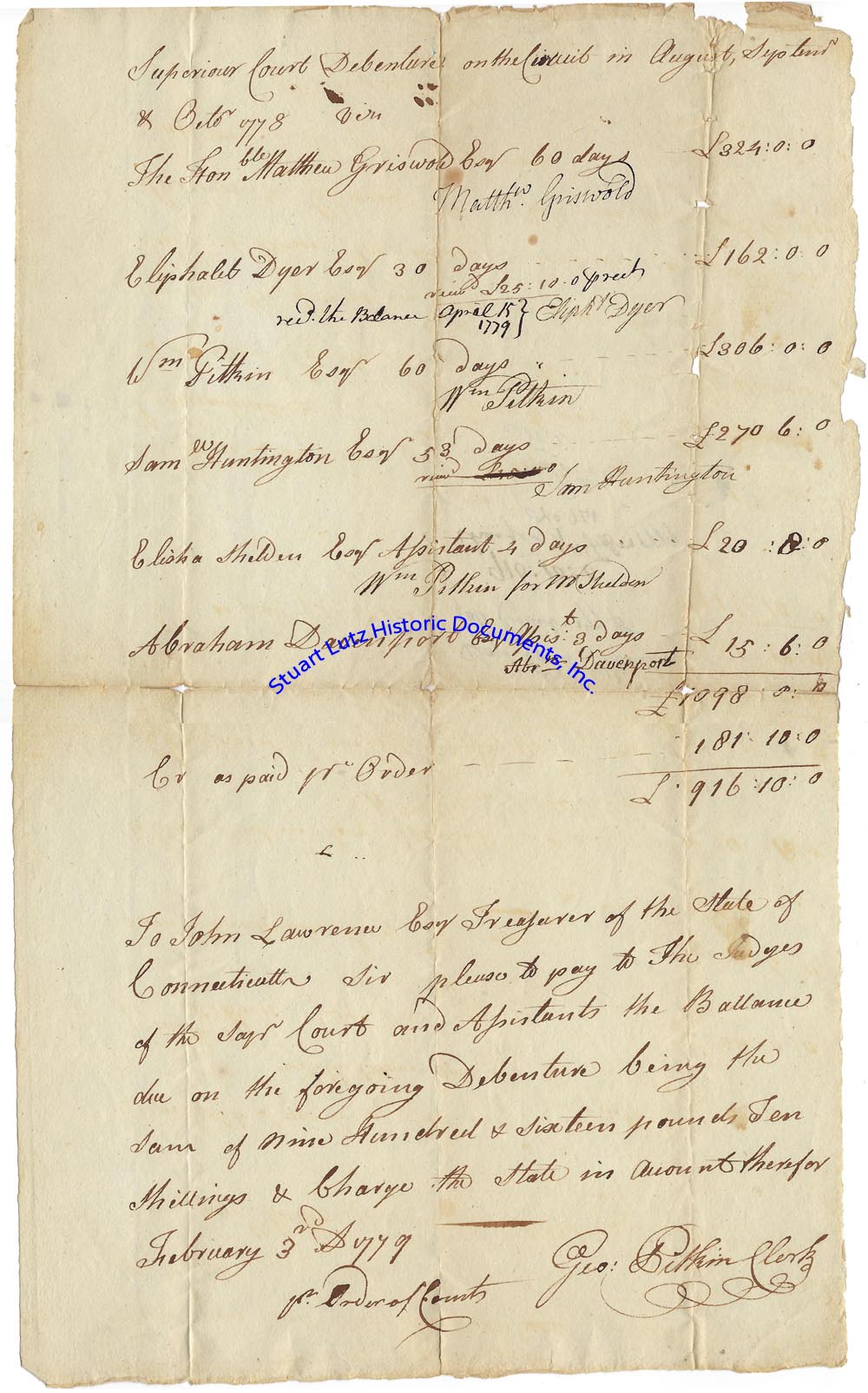
|
|
| |
| |
 SAMUEL HUNTINGTON SAMUEL HUNTINGTON |
|
|
|
|
| |
Price: $1,250.00 |
Stock# 4383 |
| |
A WAR-DATED SAMUEL HUNTINGTON AUTOGRAPH DOCUMENT SIGNED CONCERNING CONNECTICUT’S FIRST PHARMACIST
SAMUEL HUNTINGTON (1731-1796). Huntington was a Declaration of Independence Signer from Connecticut, and he also signed the Articles of Confederation. He also served as Governor of Connecticut.
ADS. 1pg. 8” x 12”. November 17, 1778. New London. An autograph document signed “Saml Huntington Assist”. The document states “State of Connecticut New London Norwich the seventeenth day of November 1778 personally appeared Daniel Lathrop & Joshua Lathrop the Signers and Sealers to the within written Instrument and Acknowledged the same to be their free aid and Deed.” Huntington wrote on the back of a real estate document signed at the conclusion “Daniel Lathrop” and “Joshua Lathrop”. Dr. Joshua Lathrop was the first pharmacist in Connecticut, and he owned a home in Norwich that is currently on the National Register of Historic Places. Daniel was his brother and business partner. The document has been lightly silked, there is a mounting remnant and there are professional reinforcements to the central vertical fold. |
4383
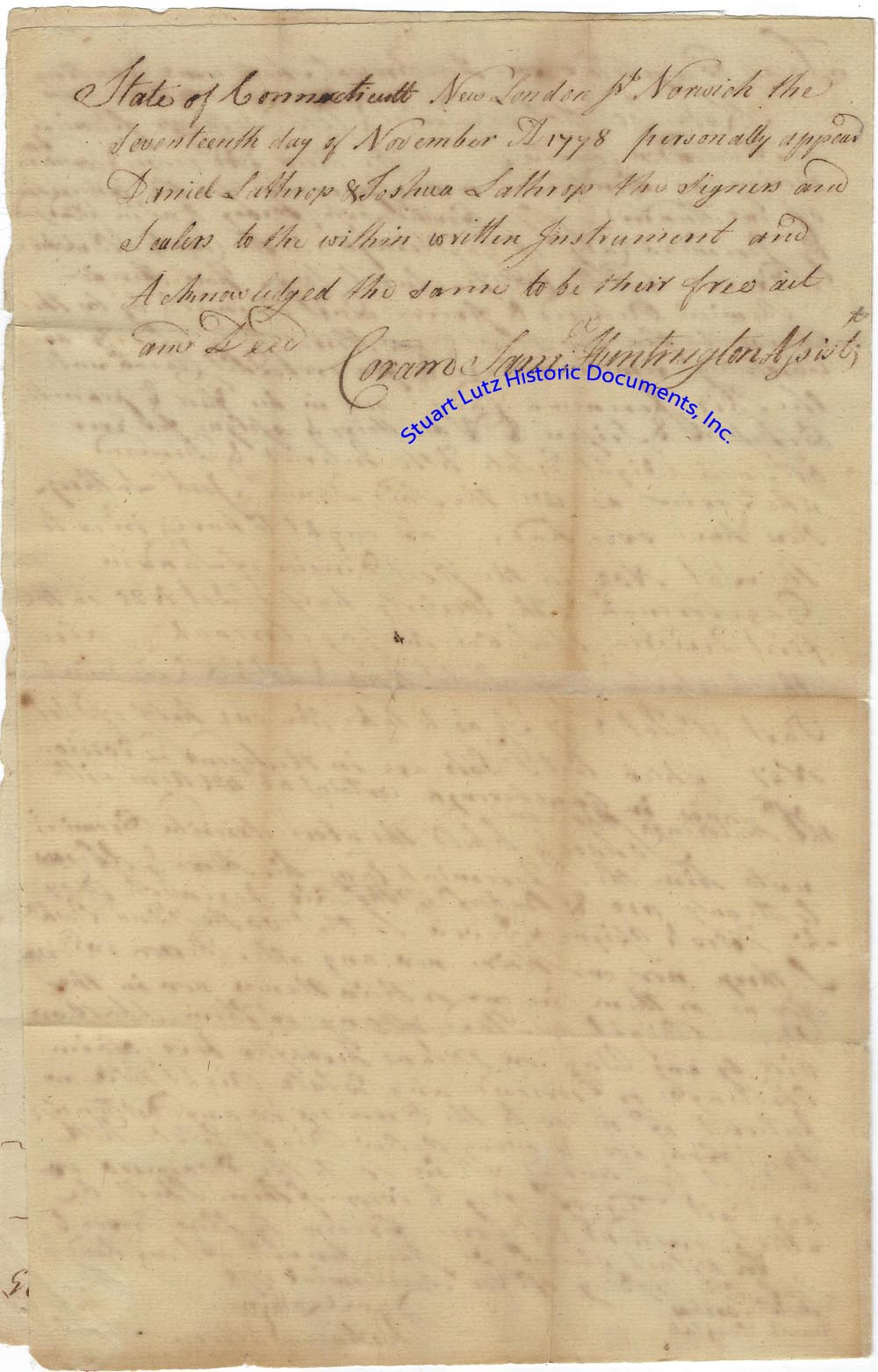
|
|
| |
| |
 BENJAMIN LINCOLN BENJAMIN LINCOLN |
|
|
|
|
| |
Price: $2,500.00 |
Stock# 4951 |
| |
A CONTEMPORARY DRAFT OF GENERAL BENJAMIN LINCOLN’S ARTICLES OF CAPITULATION OF CHARLESTON. NOT ALL WERE ACCEPTED BY THE BRITISH, BUT LINCOLN REQUESTED THAT HIS “GARRISON SHALL AT AN HOUR APPOINTED, MARCH OUT WITH SHOULDERED ARMS, DRUMS BEATING, AND COLOURS FLYING TO A PLACE TO BE AGREED ON, WHERE THEY WILL PILE THEIR ARMS”
BENJAMIN LINCOLN (1733-1810). Lincoln was a Revolutionary War general and the Secretary of War from 1781 to 1783.
(SURRENDER OF CHARLESTON, SOUTH CAROLINA). On April 2, 1780, 10,000 British soldiers under the command of General Henry Clinton sieged 3,000 Continental Army soldiers at Charleston. On May 12, the over-matched forces surrendered, marking the largest Continental Army capitulation of the American Revolution. General Cornwallis was left in charge of British forces, and Lincoln was eventually traded for a British general. After the Charleston surrender, a guerilla war broke out in South Carolina. When the British surrendered at Yorktown, Benjamin Lincoln was there to accept Cornwallis’s sword.
D. 2pg. 8” x 10”. 1780. Charleston [South Carolina]. A contemporary draft of General Lincoln’s articles of capitulation for Charleston: “Article of Capitulation proposed by Major General Lincoln – Art. 1 that all acts of hostilities and Work…Between the Besiegers and Besieged Until…of Capitulation shall be Agreed on, signed…Executed, or be collectively Rejected. Art. 2. The town and fortifications shall…[be] surrendered to the Commander in Chief of the…Forces, such as they now stand. Art. 3. The Continental Troops and Sailors – with their baggage shall be Conducted to a Place to be Agreed on – where they will Remain Prisoners of War – until Exchanged – White Prisoners, they shall be supplied with Good and Wholesome Provisions in such quantity as is Served out to the Troops of his Britanic [sic] Majesty. Art. 4. The militia now in garrison shall be permitted to return to their respectives homes, and…[be] secured in their persons and property. Art. 5. The sick and Wounded shall…be continued under the care…Art. 6. The Garrison shall at an hour appointed, march out with shouldered arms, Drums beating, and Colours Flying to a place to be agreed on, where they will pile their arms. Art 7. That the French Consul, his house papers, and other movable property shall be protected and untouched, and a proper time granted to him for retiring to…that may afterwards be agreed upon between…Commander in Chief of the British forces. Art. 8. That the citizens shall be protected in their persons and Property. Art. 10. That a twelve months time be allowed all such as do not choose to continue under the British Government, to dispose of their Effects, real and personal in the State, with out any molestation, or to remove such part thereof as they choose, as well as themselves and families, and that during that time, they, or any of them may have it as their option to reside occasionally in town or country. Art 11. That the same protection to their persons and properties, and the same time for the removal of their Effects be given to the subjects of France and Spain as required for the citizens in the previous articles. Art 12. That a vessel be permitted to go to Philadelphia with the General’s dispatches which are not to be opened. Signed May 8th 1780 B Lincoln”. This likely is an early draft, since Article 6 is not included; that stated “The officers of the army and navy shall keep their horses, swords, pistols and baggage which shall not be searched and retain their servants.” It is in an unknown hand, and is not in the writing of Lincoln’s aide-de-camp Hodijah Baylies. The document just underwent a professional restoration to remove silking and improve the overall condition, although I would still rate the document’s state as fair. There are paper losses that affect some words but the legibility has improved considerably. |
4951
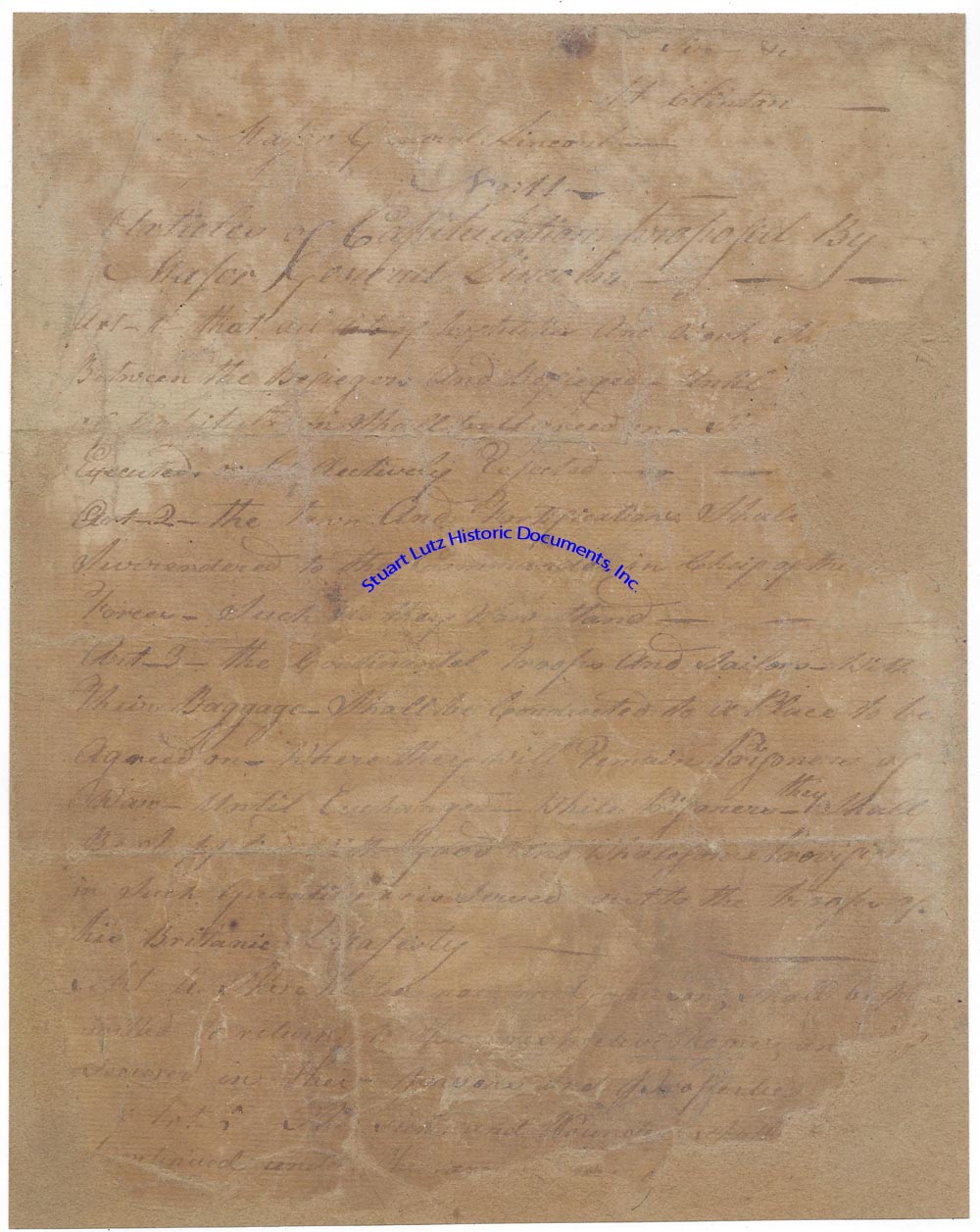
|
|
| |
| |
 MOSES MAVERICK MOSES MAVERICK |
|
|
|
|
| |
Price: $300.00 |
Stock# 6193 |
| |
CONTEMPORARY COPY OF AFFIDAVIT BY MOSES MAVERICK, FOUNDER OF MARBLEHEAD, MASSACHUSETTS, REFERENCES LONGEST-SERVING GOVERNOR IN MASSACHUSETTS COLONIAL HISTORY
MOSES MAVERICK (1611-1686). Maverick founded Marblehead, Massachusetts and served as its first selectman for 14 years.
Document. 1 pg. 6” x 8”. N.d. N.p. A contemporary copy of an affidavit signed “Moses Maverick”: “That which I can testifie [sic] is that housing…to you by the house of Peter Pitford…and defined time to tell him one thing, which was whether I had given Mr. Endicotts man William Pool any…the day before when he was at my house; I told him I had not, for I had soon about two this…at my stays and then was sent…never given Mr. Endicotts man; He told me he had nine or ten stolen out of a pile and it would be none other but Carwithing for he knew…then went; and that Mr. Endicotts man had the same…that went stolen under his arms going homeward…but so said Mr. Endicotts man would not…and to this as much as I remember I shall take my oath if called”. There are also some notes on the bottom of the document that seem to be in a different hand and are a bit faded. The Endicott referenced in the letter is likely John Endicott (or Endecott). Endicott (1600-1664) served as Governor of the Massachusetts Bay Colony for a record sixteen years, including consecutively from 1655 until his death. Moses Maverick was a respected politician in Marblehead, Massachusetts, helping it achieve its independence from the town of Salem. On the other hand, Peter Pitford is portrayed in the historical record as a feared and not well-liked man. In 1651, he was sued by a neighbor for defamation, claiming that Pitford made him so afraid that he feared for his life. In 1667, Erasmus James sued Pitford, also for defamation. However, James said he was defamed when Pitford claimed James’ wife was a witch, and he won the suit. Another source gives the date of this defamation trial as 1650 (though the 1667 date is from official records). Though decades before the infamous Salem Witch Trials (which claimed one victim in Marblehead in 1692), James’ suit highlights that hysteria surrounding witchcraft in colonial New England periodically popped up throughout the mid-to-late 17th century. The letter is in fine condition with some stains and fading at the bottom. It will be worthwhile to any student of American colonial law and history, especially Massachusetts colonial history. |
6193
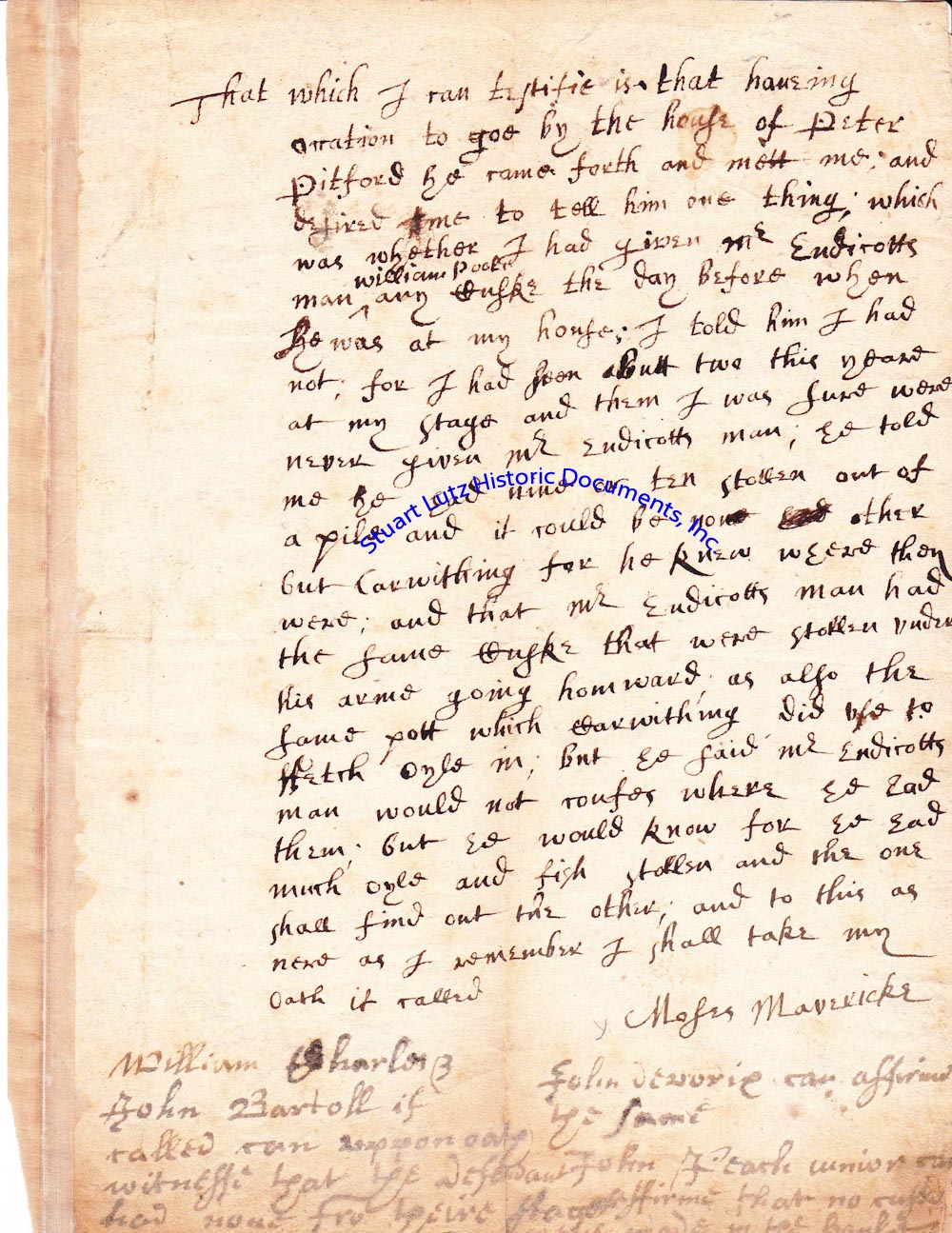
|
|
| |
| |
<Previous 6> <Next 6>
|
 |
